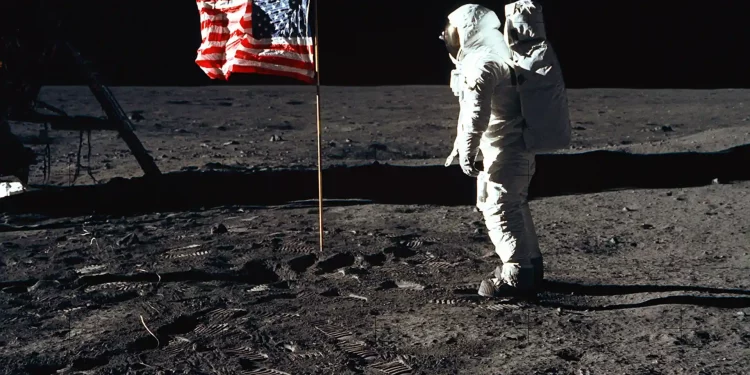On Thursday, 23rd February, the unmanned lander Odysseus, designed by Houston-based Intuitive Machines, completed its journey to the moon, becoming the first commercial spacecraft to ever achieve such a feat. In a monumental leap for space exploration, American ingenuity has once again left its mark on the moon after more than 50 years. The event marked the first time an American-built spacecraft has landed on the moon since NASA‘s Apollo missions back in 1972.
Named after the legendary Greek hero of Homer’s epic “The Odyssey,” Odysseus represents the culmination of many years of innovation and collaboration in the field of commercial space exploration. Unlike previous lunar missions, this mission was not led by national space agencies but by private enterprises, signalling a paradigm shift in how humanity ventures beyond Earth’s orbit.
The Odysseus Mission Marks a New Era in Space Exploration
The Odysseus lander embarked on its groundbreaking voyage aboard a SpaceX Falcon 9 rocket, lifting off from NASA’s Kennedy Space Centre in Cape Canaveral, Florida. Guided by a team of experts at Intuitive Machines’ mission control centre in Houston, the spacecraft set off on a meticulously planned flightpath to the moon’s south polar region, a strategic region rich with scientific potential.
In a descent marked by last-minute navigation sensor malfunctions, the Odysseus lander managed to etch its name in the annals of space exploration by becoming the first U.S.-built spacecraft to successfully touch down on the moon in over 50 years, and the first such commercial mission.
The nail-biting touchdown, which occurred at 6:23 pm EST near the crater Malapert A, was beset by technical glitches and improvised solutions. Delaying the final descent, engineers at Intuitive Machines overcame a nerve-wracking series of issues, including the accidental activation of experimental NASA sensors and the implementation of hurriedly-written software patches to ensure the lander remained on course.
Despite an initial communication blackout, a faint signal received by a communications antenna in the United Kingdom confirmed the successful touchdown, prompting jubilation among the mission control team. Two hours post-landing, Intuitive Machines confirmed the lander’s upright position and the commencement of data transmission.
NASA Administrator Bill Nelson lauded the accomplishment as a testament to the power of commercial partnerships in advancing space exploration, and launching a new era of collaboration between government and private companies. The journey was not without its challenges, either. Weeks prior, a lunar lander attempt by another aerospace company had ended in failure, showing the risks inherent in such ambitious undertakings. However, the Odysseus mission pressed on resilience and determination.
Scientific Significance and the ARTEMIS Project
While Odysseus may be unmanned, its payload carries a large suite of instruments and technology demonstrators, with which the spacecraft aims to unravel the mysteries of the moon. From studying space weather to the presence of ice, Odysseus’ mission holds great promise for advancing our knowledge of the moon.
Moreover, Odysseus’ success heralds a new age of collaboration between NASA and private companies. With NASA’s Artemis program on the horizon, Odysseus will lay the groundwork for a permanent human presence beyond Earth. The Odysseus lander was thus equipped with a suite of NASA instruments along with its commercial payloads. The mission promises to yield new insights into the moon’s environment and pave the way for the Artemis program.
The Artemis program is a NASA initiative aimed at returning humans to the Moon and establishing a sustainable presence there by the end of the decade. Named after the Greek goddess of the Moon and twin sister of Apollo (the first moon landing’s name), the Artemis program aims to pave the way for future crewed missions to Mars and beyond.
Central to the Artemis program is the goal of landing the first woman and the next man on the moon by the mid-2020s. This ambitious mission involves developing new spacecraft, such as the Orion and the Space Launch System (SLS) rocket, which will serve as the new backbone of NASA’s exploration efforts. Additionally, the Artemis program aims to establish a lunar outpost, the Gateway, which will orbit the Moon and serve as a staging point for more lunar missions.
The Mission Marks an Escalation in the New Space Race
The Odysseus mission comes in the backdrop of a 21st century where the original space race between the United States and the Soviet Union has evolved into a new global competition, fueled by security, technology, and commercial interests, with countries like Russia, China, India, and Japan all vying to establish their presence beyond Earth. Yet, it is the emergence of a cadre of entrepreneurs that has reshaped space exploration, offering innovative new solutions to advance humanity’s quest for the stars.
China’s ambitious lunar exploration projects, coupled with its plans for a permanent space station and crewed moon missions, show the escalating tempo of the modern space race. Likewise, Japan’s foray into space with missions aimed at asteroid mining and lunar landing technologies signals its intent to compete on the global stage.
India too, despite operating with a fraction of NASA’s budget, has made massive strides, with groundbreaking lunar and solar missions, showcasing the country’s growing space capabilities. As these new challengers assert their presence in space, America’s historical leadership is seen to be facing major challenges, including budget constraints and unstable political will.
Enter the visionary entrepreneurs: Musk’s SpaceX, Bezos’ Blue Origin, and Branson’s Virgin Galactic. These trailblazing companies are revolutionising space exploration, each with its unique focus and goals. SpaceX’s relentless pursuit of better rockets has positioned it as a linchpin in NASA’s Artemis program, while Blue Origin’s emphasis on sustainable space exploration holds great promise too.
Virgin Galactic, meanwhile, aims to democratise access to space, ushering in an era where ordinary citizens can experience the thrill of spaceflight. Together, these companies represent a new paradigm in space exploration, where private enterprise collaborates with government agencies to achieve shared goals. Musk’s audacious vision of colonising Mars, coupled with SpaceX’s low-cost rocket launching capabilities, has revitalised America’s space ambitions.
As NASA leans heavily on SpaceX for crewed missions to the International Space Station and beyond, the partnership between government and private industry has never been more critical.















